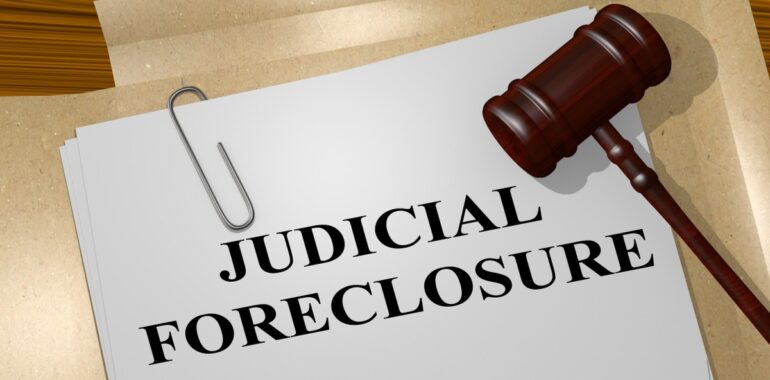By Norma Lewis, LLM
I a judicial foreclosure, the property owner gives a mortgage and note to a lender in exchange for a loan. The real property is collateral for the loan. Suppose the borrower fails to repay the loan or otherwise defaults on the loan by failing to follow the loan terms. In that case, the lender may file a foreclosure action in the appropriate New York State Court, which would be the Supreme Court in the county in which the property is located. Most foreclosure cases in New York State are of the judicial type. Another type of non-judicial foreclosure involves a mezzanine loan. A mezzanine loan consists of a security interest in the company's stock shares that owns the real estate in question, similar to a coop loan.
Because New York State currently has a moratorium, due to the effects of the Covid-19 pandemic, on judicial foreclosures. Under this Administrative Order, "no auction or sale of property in any residential or commercial matter shall be scheduled to occur before October 15, 2020." However, not every foreclosure case in New York is a judicial foreclosure or requires the lender to go through the Court. Non-judicial foreclosures occur most commonly in proceedings instituted on behalf of cooperatives.
Now let's explore the Judicial Foreclosure Process in New York State:
To commence judicial foreclosure litigation here in New York State, there are (3) three court pleadings that the lender usually prepares to initiate a foreclosure lawsuit, i.e., the complaint, a summons, and a notice of Lis Pendens.
What is the Complaint for Foreclosure?
The "complaint," sometimes called a "petition," for foreclosure sets out the claims of the foreclosure lawsuit. It generally describes the following:
•The mortgage
•The promissory note
•The property to be foreclosed.
•The default
•The amount due, and
•The defendants, along with their interest in the property.
The complaint will also state the type of relief or remedy the lender is seeking; For example, the complaint will ask for the right to sell the property and apply the sale proceeds to the mortgage debt. The complaint may also request a deficiency judgment if the proceeds at the foreclosure sale do not fully cover the total debt amount.
What is a Summons in a Foreclosure Lawsuit?
In a judicial foreclosure, a summons is issued by the Supreme Court for each Defendant named in the foreclosure lawsuit. Once prepared and dated, the Summons should be filed in the Supreme Court of the county where the property is located. Typical defendants in a foreclosure lawsuit are the:
•Homeowners (borrowers)
•Lienholders
•Judgment holders, and
•Occupants (if any).
The Summons notifies Defendant their right to file an answer to the suit and how many days Defendant has to respond, which is usually 20 to 30. As per CPLR[1] §3012(d), a party may extend the time to appear or plead or compel acceptance of a pleading untimely served, upon such terms as may be just and upon the showing of reasonable excuse for delay or fault.
Additionally, the parties stipulate to extend the time to answer if it is so warranted. The Summons is generally issued to the Defendant in his/ her native language. If you want to answer the complaint's claims and fight the foreclosure, you must file your answer within this time frame once you duly served.
What is a Notice of Lis Pendens?
"Lis pendens" is a Latin phrase that means "suit pending." When a lender starts a foreclosure, a notice of lis pendens is recorded in the County Clerk's records. The notice of Lis Pendens' purpose is to inform the public that a lawsuit involving the property is pending. In other words, the lis pendens serves as actual and constructive notice to the world that there is a pending lawsuit concerning the real property.
The notice of lis pendens is typically a one- or two-page document that includes the legal description of the property and states that a foreclosure has been started.
How to answer the Foreclosure complaint?
In your answer, you need to address all of the allegations in the complaint. For each numbered paragraph in the complaint, you should admit, deny, or say you don't have sufficient information to admit or reject (and therefore you deny) the allegations contained in that particular paragraph. You may also ask that the lender prove its causes of actions, like how much it says you owe and the fees it says are due. Remember that if you admit an allegation, the lender doesn't have to prove it. You'll also need to raise any defenses, and affirmative defenses in your answer, such as the lender doesn't have standing (the right to foreclose) or improper service of process. Also, as well as any counterclaims, like the servicer violated federal mortgage servicing laws when you applied for a loan modification, if applicable.
Suppose this is your first foreclosure lawsuit, and you decide to answer the foreclosure complaint without an attorney's assistance and represent yourself in court proceedings. In that case, you'll need to devote a substantial amount of time to conducting research, getting your paperwork in order, and preparing your arguments. Because the law is complicated and court procedures vary quite a bit, it's a good idea to hire a skilled attorney to assist you in the process.
In conclusion, because your home is your castle and you may have invested a significant amount of money and resources before default, you should consult with a professional attorney to assist you in the judicial foreclosure process.






